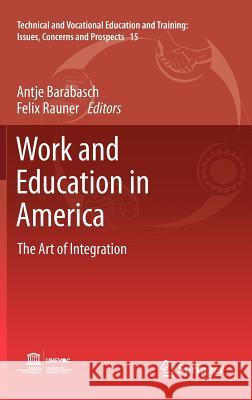Work and Education in America: The Art of Integration » książka
Work and Education in America: The Art of Integration
ISBN-13: 9789400722712 / Angielski / Twarda / 2011 / 272 str.
Work and Education in America: The Art of Integration
ISBN-13: 9789400722712 / Angielski / Twarda / 2011 / 272 str.
(netto: 384,26 VAT: 5%)
Najniższa cena z 30 dni: 385,52
ok. 16-18 dni roboczych.
Darmowa dostawa!
This, the first comprehensive academic volume on vocational education and training (VET) or career and technical education in the United States, features insights into a variety of issues in this field of research. The international reader will find an up-to-date synthesis as well as a critical analysis of the relevant history, philosophy, governance, legislation and organizational structures. The coverage is structured according to the benchmarks applied to, as well as the theoretical discussions around, VET. The topics covered all have a strong contemporary relevance and include education versus qualification, the American community college, the issue of localization versus globalization in governance, vocationalism in higher education, career guidance and career counselling, and apprenticeships in the U.S.
This book supports the assertion of the relevance of career and technical education -both for the individual and the labour market. Scholars, policy makers and practitioners interested in issues of vocational education and training, technical education, and career education will find this collection of critical and reflective discussions very useful in any analysis of the features of VET approaches taken in America."
Vocational education and training (VET) has never taken hold in the United States as it has in Europe. Up to today schools in the U.S. are coined as institutions for humanistic education without preparing young adults to function in specific occupations. Therefore, relatively little provision of qualification for skilled work is provided in cooperation with the industry. "Work and Education in the United States" provides an overview of vocational education in the United States for an international audience. The volume consists of twelve chapters reflecting primary pathways to learning and referring to multiple views on integration in the sectors of education and work to the extent to which they are interwoven. It showcases that vocational or career and technical education cannot successfully be pursued without their interconnectedness to academic learning, to different approaches towards workplace teaching and learning, and without including various people and their diverse ways of approaching work and education. The coverage of topics relates to benchmarks and theoretical discussions around VET, such as patricipation rates, career counselling, the multi-tiered VET system, the role and function of community colleges in American VET as well as issues of governance, quality management and evaluation.











